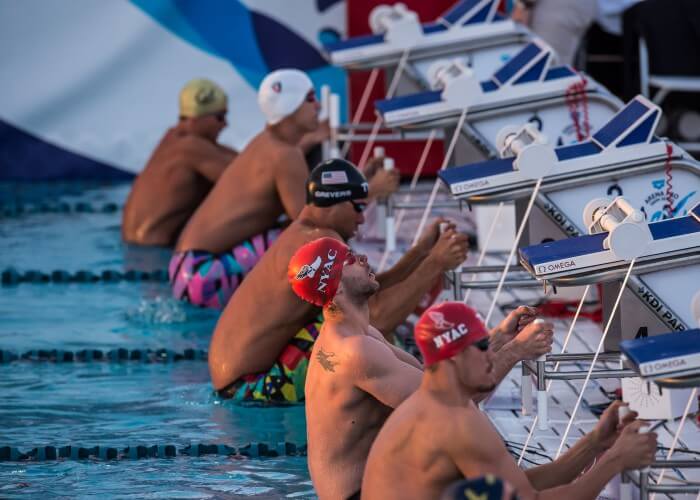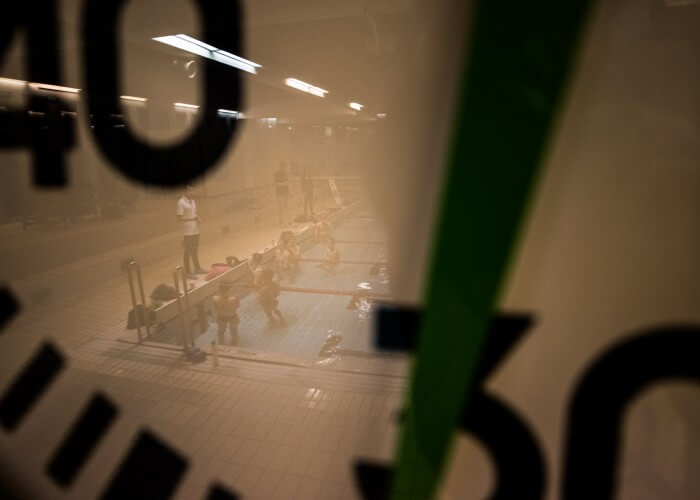How to Avoid Becoming That Constantly Sleepy Swimmer

Ashleigh Shanley, Swimming World College Intern
As the summer comes to an end, so do the simple days that consist of eating, sleeping and swimming. Instead, we get thrown into school, and all the craziness that comes with a strict schedule and a boatload of work. However, with these new additions, it seems that sleep is the factor that will get thrown out of the simple eat-sleep-swim schedule.
Yet, sleep is so important to the other factors in the simple equation that can lead to success, that it is important to find ways to maintain a healthy sleep schedule. There are quite a few reasons why athletes, especially swimmers, need sleep.
1. How does sleep help athletic performance?

Photo Courtesy: Peter H. Bick
Every practice, you break down your muscles. Every lap, every stroke, and every kick requires exertion of energy. But in order to build your muscles up, you have to break them down. However, to properly recover from your workouts – whether it is strength and conditioning or swimming – you need to get a significant amount of sleep. No matter how much protein you take after your workouts, your muscles need a full night to adequately recover after a long, physically exhausting day.
Getting sleep helps for a few reasons. First, during sleep your body is able to restore cell growth and releases natural human growth hormones, which help to build up your muscles. This means that during your sleep your body is repairing what you broke down that day, and in a sport that works our body incredibly hard, it is critical to allow this process to take place.
Secondly, sleep is needed to recharge your brain– your center of focus and motivation. When your brain gets a proper amount of sleep, it is able to stay more alert the next day. This means quicker reactions, a higher level of focus on details, and more motivation to work hard and push yourself to the next level. And when you miss out on that sleep, you hurt yourself by decreasing those reaction times.
In addition to helping with muscle growth, sleep can help to reduce injury by allowing your muscles to recover and be ready to go for the next day of training. And since sleep deprivation and fatigue weaken the immune system, by getting more sleep you can reduce your chance of illness so that if you do come across an injury your body can focus solely on fighting that problem.
2. How much sleep should I get?

Photo Courtesy: Robin Sparf
It will forever be debated on what the proper amount of sleep is, and what might be too much or too little. However, with a consistent amount of support, it seems that seven to eight hours of sleep a night is the ideal amount to let your body cycle through the sleep cycle to properly regenerate and recharge.
One important part of maintaining a good sleep schedule, is sticking to those times. Each night, do your best to go to bed around the same time and wake up at the same time. This will help your body know when it needs to rest and recover, allowing you to have an even better night’s sleep.
When you oversleep, or go to bed hours later than your body expects you to, you confuse your body and throw it out of its normal circadian cycle and rhythm. This can then force you to alter your sleep schedule the following week, because your body is trying to recuperate and adjust back to a normal schedule. Stick as closely to a schedule as you can to get the most restful sleep possible.
3. What are some ways to help me fall asleep?

Photo Courtesy: Wikipedia
Dr. Mark Rosekind, the president of Alertness Solutions, was evaluating the sleep habits of Olympic Winter athletes when he noticed that the sleep environment is very important in trying to get a worthwhile night of sleep.
The first suggestion he made was making the room dark enough so you are not kept up and distracted by outside lights or moonlight. In addition to distractions, Rosekind said that intrusive noises– outside voices, loud bangs, or inconsistent sounds, can keep you from falling asleep or can shock you awake, breaking you out of your sleep rhythm. To reduce the chance of this happening, constant noise like white noise from a sound machine or a fan can help to drown out inconsistencies when you are trying to fall asleep and stay asleep.
Overall, sleep is very important to your athletic career and daily functions so make sure you start the school year off right. Once you set your sleep schedule, everything else will fall into place and it will be easier to manage morning practices, classes, schoolwork and those tough afternoon practices.
If you think you will be up late studying, avoid that possibility by skipping out on Netflix that night or shortening your afternoon nap so you can stay true to your nightly sleep schedule. You may start to notice drastic improvements in your daily workouts and significant progress in your season.



